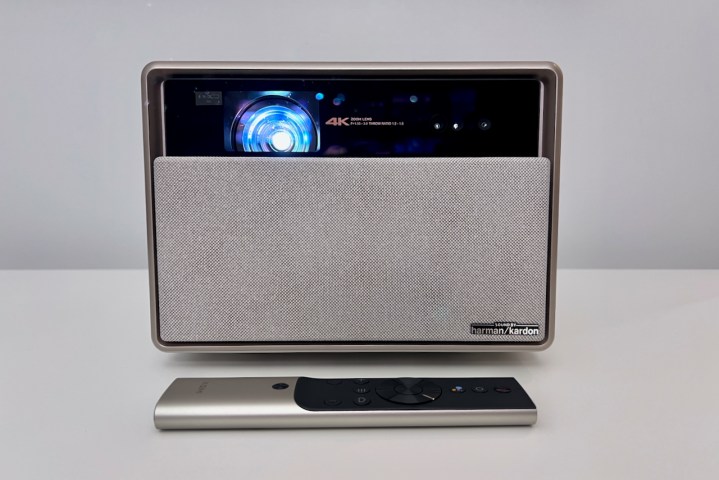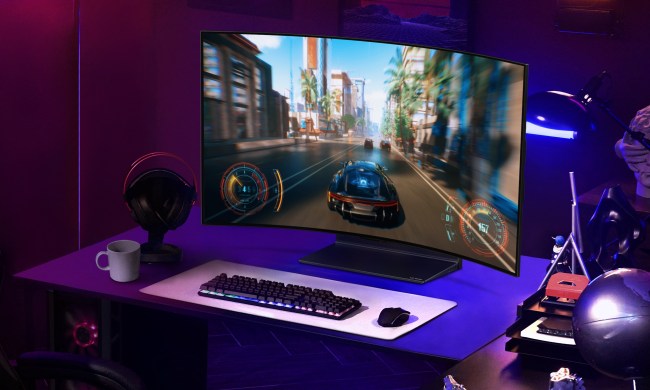“Xgimi is at it again with the bright and beautiful Horizon Ultra that impresses with Dolby Vision support and smart features for days!”
- Dolby Vision HDR support
- Smart auto picture adjustments
- Great dark-room brightness
- Excellent color accuracy
- Compact, premium design
- OK in brighter rooms
- Setup's a pain for non-Android users
- Sound could be better
When you slide the Xgimi Horizon Ultra from its pristine, styrofoam-lined Apple-esque packaging, there’s a palpable “ooh” moment. The $1,700 4K smart projector sure is pretty, and it even feels premium in your hands with its smooth faux leather covering and soft aluminum accents. “Pretty,” “smooth,” and “soft” are not words I’ve used to describe a projector before, making me instantly wonder how this objet d’art could have a price tag of less than two grand, and be stacked with features that some higher-end projectors don’t even have, most notably a little thing called Dolby Vision.
A first for a 4K long-throw projector, Dolby Vision — combined with the use of laser and LED lighting in what Xgimi calls “Dual Light” technology — makes for an impossibly bright and color-accurate projector for the price, which gives the Horizon Ultra a significant leg-up on the competition. It’s super compact for not being a “portable” projector and it runs Android TV 11, which makes for fast and easy setup and operation.
Xgimi seems to have pulled off the impossible here, so let’s check it out.
Xgimi Horizon Ultra: A projector with smarts
Like other Xgimi projectors, such as the cute and portable MoGo 2 Pro, the Horizon Ultra is a smart projector that is easy to set up and use. Its Android TV 11 OS makes for a simple setup, especially if you’re an Android user as you can just have it port all of your apps, user names, passwords, and more, over to the projector in a couple of taps on your phone. Sadly, though, everyone else has to go through the long dance of searching and pecking out login details for your streaming apps using the included remote and those horrible on-screen keyboards, something I wish someone would fix. However, if you’re not into Android TV and prefer to just connect your own streaming device and bypass all that nonsense, there are two HDMI ports.
Positioning and setting the image size is also pretty straightforward. The Horizon Ultra is capable of throwing an image from 40 to 200 inches, the specs say, and it has a throw ratio of 1.2 to 1.5:1. I was able to get a 100-inch image size from roughly 100 inches (8.3 feet) away. But I also tried moving the projector a little further away to give me a slightly larger image, that way I could use the projector’s optical zoom-in feature to more easily fine-tune with the remote. This worked well.
As mentioned above, the Horizon Ultra also has a ton of smart features that punch above its weight. Its auto-keystone correction is among the best I’ve ever used. On startup and/or whenever the projector is moved, it automatically adjusts and straightens the image accounting for any vertical or horizontal angles you might have, and it can do this at some pretty extreme angles. Autofocus keeps the image sharp and crisp, auto-screen alignment adjusts the image to the edge of the screen, and there’s also an image displacement adjustment if you need to nudge the image up, down, left, or right. All of these features can be fully automatic or manual, so you can pretty easily adjust the Horizon Ultra’s image to suit your ideal screen and image size.
Additionally, the projector includes obstacle avoidance tech that detects things like art on your walls and will adjust the image size to avoid them. I found it to work only some of the time with smaller objects like light switches, and as handy as it is, I ended up disabling it. The other feature I disabled was intelligent eye protection, which is a great idea for those with little kids and dogs as it detects movement in front of the projector and dims the bulb to keep little eyes safe. But it can get annoying as it triggers anytime anyone or anything passes in front.
Connectivity-wise, the Horizon Ultra has a wide range of options, including the aforementioned HDMI inputs (with one eARC), two USB ports, Chromecast, Bluetooth 5.2, and a LAN connection should you prefer that over its built-in Wi-Fi 6. For audio out, there’s a 1.5-mm port for headphones or a set of speakers, should you want to connect them, or there’s an optical output, too. Oh, this might be a good time to mention that Horizon Ultra’s two 12-watt built-in Harman Kardon speakers that support DTS-Virtual: X (more on this later).

Xgimi Horizon Ultra: brightness, color, and HDR
In a completely dark room, the Horizon Ultra’s brightness and contrast performance are excellent, and pretty good in the daytime, too. For such a compact and reasonably priced projector, I was blown away, regardless of whether I was watching Dolby Vision content (which, of course, was better) or other HDR content (it also supports HDR10 and HLG). To be clear, we’re not talking rich, dense black levels akin to an OLED TV. So if that’s your expectation then you’d best steer clear of projectors altogether, or be prepared to mortgage your house. But for sub-$2,000, Xgimi has got something special on its hands here.
Driven by 2,300 ISO lumens of brightness (roughly 2,875 ANSI lumens, if you’re keeping track), I found the Horizon Ultra to be plenty bright and vivid, even when compared to higher-priced and brighter long-throw projectors, such as the $3,000, 3,200-lumen BenQ HT4550i I previously reviewed. And like the HT4550i, the brightness and contrast settings are tweakable for days, allowing you to find your preferred balance. All this can be attributed to Xgimi’s strides in improving image processing and, specifically, its “Dual Light” system, which combines LED and laser projection technology for what Xgimi says offers the best of both worlds for better color accuracy and brightness. And from my testing, considering the lower 2,300 lumens rating, they’re doing something right here.
Not to harp on the cost-to-performance benefits, but the Horizon Ultra’s color is fantastic, too, when compared to other, more expensive 4K long throw projectors. Out of the box, color reproduction is great and seems accurate no matter what I was watching and from whatever source. Covering up to 95.5% of the DCI-P3 gamut, the standard used by the digital cinema and film industry, and 99% of Rec.709, when watching non-Dolby Vision UHD content such as Prime Video’s Wheel of Time (I had watched this series on my LG OLED), big, sunny-day blue skies display beautiful and clear, the textures of the castle-wall bricks are vivid and lifelike, and the golden and orange swirls of the One Power glow with just the right amount of saturation. Darker tones could be darker for sure, but they’re not bad.
- 1. A scene from Wheel of Time in Dolby Vision
- 2. A scene from Wheel of Time in Dolby Vision
- 3. Dolby Vision settings can be fine-tuned
- 4. Picture settings for days
To ensure you get the ideal brightness and color settings, the Horizon Ultra is pretty foolproof and has auto adjustment features for both brightness (based on the ambient light in the room) and color accuracy (it can measure the color of the wall or screen you’re using). Again, though, if you prefer a little more or less sharpness, brightness, contrast, color temperature, or saturation, for example, you can head to the Custom menu in Image Mode and fiddle away.
But wait, did I just yadda-yadda over the part where this thing does Dolby Vision? Because it does. And it does it well. First, it’s seamless. When watching Dolby Vision titles, whether on Netflix, Disney+, or on a Blu-ray for example, a notification appears on the screen to let you know that the picture has been optimized for it, which the projector does automatically like compatible TVs have done for years. The high-quality HDR standard allows the projector to receive additional scene-by-scene image information from Dolby Vision sources, which in street speak means more dynamic and accurate images. Additionally, you can also tell the projector your screen’s size and gain level for further Dolby Vision optimization.
Xgimi Horizon Ultra: sound performance
From the built-in dual 12-watt speakers on the Horizon Ultra, you get a couple of sound-setting options. By default, it is set to something called “Harman Kardon Original,” which, by the sounds of it, is standard stereo sound. For built-in speakers, the sound is OK. It’s clear at reasonable volumes (things get mucky when turned up too high), has decent mids and highs, and will do the trick in a pinch or until you get yourself a soundbar or use the projector’s HDMI eARC or optical ports to get more serious about it.
Then there’s the Ultra’s “DTS-Virtual: X” setting, that I can’t quite put my finger on. According to the DTS website, Virtual: X is supposed to be “capable of delivering an enhanced sound immersion and home theater experience with as few as two speakers.” I’m not sure that it’s pulling it off in the Horizon Ultra — I just don’t think the speakers are powerful enough. On the one hand, when compared to the “Harman Kardon Original” setting, the sound separation seems to widen a bit, making sound effects like laser blasts and explosions seem more distinct, but I wouldn’t by any stretch of the imagination call it “immersive.”
Dialog is clear on both settings, to be sure, and that’s a good thing, but both settings are also desperately lacking in the low end. But look, if you’re going to invest even a couple of thousand dollars in a projector as capable as the Horizon Ultra, do yourself a favor and get a soundbar or other sound solution; you won’t regret it.
Bottom line
If you’ve been looking to usurp your TV and go the way of the projector to elevate your living room setup to a more theater-like experience, the Xgimi Horizon Ultra and its more-than-reasonable $1,700 price is a great start to test the waters. While it’s not a space-conscious ultra short throw projector, and you will have to take things like room size and furniture placement into consideration, the Horizon Ultra is compact enough to easily move around during setup, which is simple enough with its Android TV OS and laundry list of automatic image adjustment features that make it perfect for beginners out of the box.
But even if this isn’t your first rodeo, the Horizon Ultra holds its own with projectors twice its price. With the combination of its 2,300 ISO lumens of brightness, Dual Light system, Dolby Vision support that has only really been seen in higher-end projectors, and advanced picture adjustment features for those with the dexterity to play around, Xgimi has somehow packed all that and more into a gorgeous package and I wouldn’t hesitate to put it at the top of your projector shopping list.













